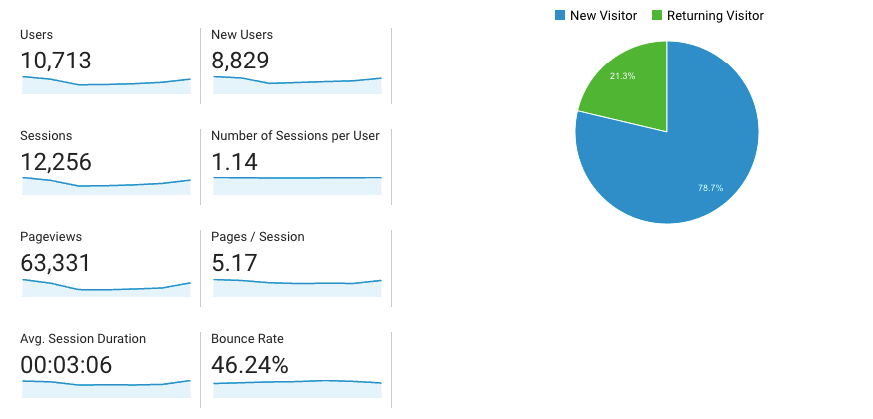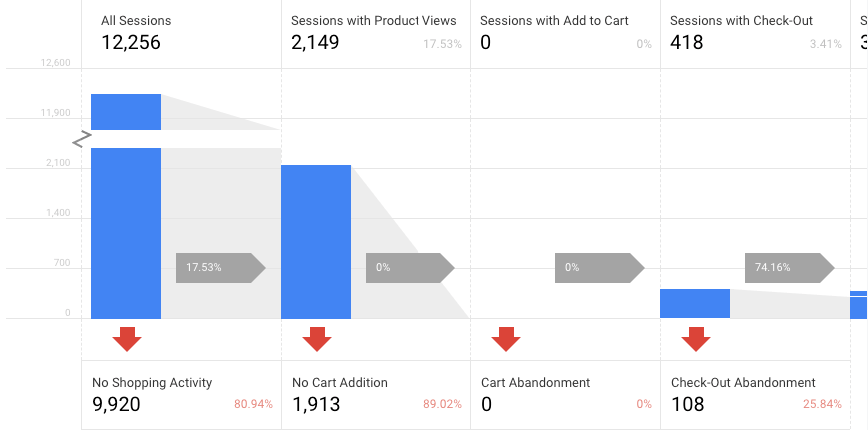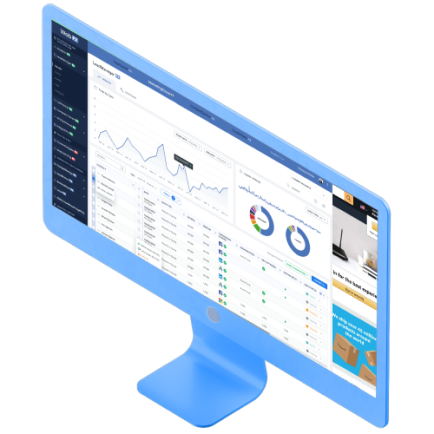On this page, we’ll go over everything you need to know about analyzing data for ecommerce, including:
- What is ecommerce marketing analytics?
- Benefits of ecommerce marketing analytics
- Tips for interpreting ecommerce marketing data
Keep reading to learn more about ecommerce marketing analytics!
Want to start improving your marketing with ecommerce analytics today? Contact us online or call us today at 888-601-5359 to speak with a strategist about our marketing analytics services!
What is ecommerce marketing analytics?
Ecommerce analytics data includes key insights from your marketing campaigns that allow you to evaluate and improve your campaign performance. With ecommerce marketing analytics, you can improve customer experience and deliver more effective marketing campaigns.
Analytics vs. metrics: What’s the difference?
When looking at ecommerce marketing analytics, you may see mention of metrics. While it may seem like these terms are interchangeable, they have distinct meanings in terms of marketing:
- Metrics: Metrics are the data and numbers you collect about your marketing.
- Analytics: Analytics are the interpretations and insights you gain from analyzing your data.
The way to think about it is that the metrics are the “what,” and the analytics are the “so what.” While both involve data, metrics are just the collection of the different data points, while analytics evaluates those data points for patterns and deeper understandings.

4 benefits of data analysis for ecommerce
So, why does ecommerce data analysis matter? Here are four reasons leveraging ecommerce marketing analytics benefits your business:
1. You can measure the effectiveness of your campaigns
One of the biggest reasons analyzing data for ecommerce matters is that it helps you see the effectiveness of your campaigns. Having a spreadsheet of numbers doesn’t tell you what your campaigns are doing –– analyzing the data provides you with insight into your campaigns.
Data analysis enables you to look at your campaign performance and understand what’s working and what isn’t. As a result, you gain valuable insight into your campaigns and how you can optimize them to drive better results with your marketing.
2. You can identify customer patterns and behaviors
Ecommerce data analysis enables you to learn more about shoppers. When you analyze your data, you can discover any common customer patterns or behaviors on your website.
For example, you may find a distinct pattern of shoppers abandoning their carts once they get to the page to pay for the items. This behavior can indicate a problem with your checkout process, which you identify by analyzing the data.

Understanding customer patterns and behaviors can help you better cater to your audience and improve the customer experience.
3. You can better understand your audience so you can upsell and cross-sell
Using ecommerce marketing analytics, you can better understand your audience. Not only can you track their patterns and behaviors, but you can also uncover which strategies engage your audience the most, what interests them the most, and more.
Once you analyze all this data, you can uncover ways to personalize the marketing experience for your audience. You can tailor your marketing to nudge more prospects towards converting and buying your products.
It also creates the opportunity for you to upsell and cross-sell. When you gain insight into how your customers shop and what interests them, you can keep them buying from you by making personalized recommendations to upsell and cross-sell.
4. You can uncover trends surrounding your business
One of the most significant benefits of ecommerce marketing analytics is that it helps you identify trends with your business. When you analyze your marketing data, you can see if there are certain periods that people engage with your business more or if a particular product receives higher engagement at a specific time.
For example, let’s say you sell a line of sauces. You find that, around Christmas time, your bundle packs sell more than any other time of the year. As a result of analyzing this data, you may shift to promote your bundle packs more during Christmas time and up inventory for those products during that time.
Uncovering trends through data analysis for ecommerce enables you to sell more and drive better results with your marketing.
4 tips for analyzing data for ecommerce
Want to know how to do data analysis right? Here are four tips for analyzing data for ecommerce:
1. Set clear goals
Before you start doing data analysis for ecommerce, you want to set goals. Setting goals lets you know if you’re achieving what you desire with your marketing campaigns. It also allows you to analyze your data more efficiently to make sure you’re reaching your goals.
You want to create SMART goals, which stands for:
- Specific: SMART goals are specific, meaning that they offer precision. Setting a goal like “earn more leads” is not a SMART goal. A goal like “Earn 10 new leads in two months” is specific.
- Measurable: When you set goals, you need to measure them to see if you achieved them. A goal like “earn 20 sales in two months” can easily be measured.
- Achievable: You don’t want to set unrealistic goals for your business, as it just sets you up for failure. You also don’t want to set too easy of goals. Setting goals that are challenging but attainable will work best for your business.
- Relevant: Your goals should always relate to your business and what you’re trying to achieve. Whether you want to increase leads or drive revenue, your goals should reflect that.
- Timely: When you set your goals, you need to set a time limit. Whether it’s a month, a quarter, or a year, you need to put an end time limit to your goals to ensure you achieve them in the right amount of time.
Setting SMART goals is the best way to guide your data analysis for ecommerce and know what you need to look at to see if you’re reaching your goals.
2. Know what data you’re analyzing
Before starting an ecommerce data analysis, you must determine what you’re analyzing. If you don’t determine what you’re analyzing, you’ll have a sea of data and no idea where to look to discover insights.
You’ll want to establish the metrics that matter most to your campaign and goals, so you can narrow your focus when analyzing the data.
Here’s a breakdown of the common metrics businesses track for each marketing strategy:
- Search engine optimization (SEO): For SEO, you can track metrics like traffic, conversions, and bounce rate.
- Pay-per-click (PPC) advertising: For PPC, you can track metrics like click-through rate (CTR), conversions, and return on ad spend (ROAS).
- Email marketing: For email marketing, you can track metrics like open and click rates, bounce rate (hard and soft), and unsubscribe rate.
- Social media marketing: For social media marketing, you can track metrics like organic impressions and site traffic from social media.
- Social media advertising: For social media advertising, you can track metrics like cost per click (CPC), CTR, and conversions.
- Content marketing: For content marketing, you can track metrics like lead generation, dwell time, and page views.
You can analyze that data to gather insights from your marketing campaigns when you know what metrics to track.

3. Set benchmarks
When you look at ecommerce marketing analytics and draw up conclusions about your campaigns, you must set benchmarks. It’s challenging to analyze data if you don’t have something to compare it to.
Benchmarks help guide your inferences. For example, if you’re monitoring shopping cart abandonment, it’s hard to know what your abandonment rate means if you have nothing to compare it to.
If you know you have a benchmark abandonment rate of 70%, for example, you can use that number to compare your current abandonment rate and make inferences about your checkout process.
With benchmarks, you have a starting point. You know what to compare your data to and can draw inferences from that information. It helps you gain better insights from your data, leading to more actionable decisions for your company.
4. Use a data analysis tool
When you do data analysis for ecommerce, use a data analysis tool to help you. Sifting through all your data manually is time-consuming. Not to mention, if you run multiple types of marketing campaigns, you have even more data to sift through.
You can easily gather and analyze your data to uncover valuable insights with a data analysis tool. Some popular data analysis tools include:
With the help of data analysis tools, you can gather insights faster, so you can start making changes sooner.
Meet RevenueCloudFX:
One platform tracking countless metrics and driving stellar results.
Learn More About Our Proprietary Software

WebFX can help you uncover actionable insights through ecommerce marketing analytics
Ecommerce data analysis is critical for helping you gather insights into your marketing campaigns so that you can improve them. At WebFX, we have a team of over 500 marketing experts ready to help you improve your marketing campaigns.
Our team of experts knows how to use marketing analytics to improve marketing campaign results. We’ve driven over $10 billion in revenue and handled over 14.9 million transactions for our clients in the past five years alone. You can feel confident we’ll optimize your marketing to drive better results.
Ready to earn more sales through your analyzing your marketing? Contact us online or call us today at 888-601-5359 to speak with a strategist about our marketing analytics services!
Related Resources
- CPA Calculator
- CPM Calculator
- Data Activation Platform: What It is and How to Drive Leads
- Data Studio Report Examples: 7 Google Data Studio Reports to Inspire You
- Get the Scoop on UTM Codes for Better Campaign Tracking
- How to Analyze Sales Data and Optimize Your Pipeline
- How to Calculate and Improve Website ROI
- How to Measure Digital Marketing Success: 7 Metrics to Watch
- How to Measure Engagement vs. Effort
- The 8 Best Free Data Studio Templates of 2025
Marketing Tips for Niche Industries
- Digital Marketing Strategies for Nursing Homes
- Digital Marketing Strategies for Online Education
- Discover the Best Entertainment and Media Marketing Agencies
- Drug Treatment Marketing Strategies
- Ecommerce Marketing Agencies of 2025
- Ecommerce Marketing Pricing Guide
- Ecommerce Marketing: 10 Expert Tips That Drive Sales
- Education Marketing ROI: How to Calculate and Improve It
- Education Statistics/education Industry Statistics
- Farm-Direct Marketing: 3 Strategies Helping Your Farm Earn More











